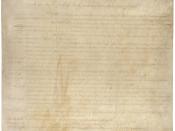The same censorship that made George Orwell's novel "1984" a classic can be seen currently in the Federal Communications Commission's ("FCC") campaign for censorship. The present day actions taken by the FCC to deny the right to freedom of expression should be deemed unconstitutional.
The First Amendment in the United States Bill of Rights states that we have the freedom of expression without government interference. However, bills passed by the government, such as the Broadcast Decency Enforcement Act of 2004 ("Decency Act"), are in direct violation of this Amendment. The Decency Act essentially gives the FCC the ability to fine broadcast station licensees for demonstrating or broadcasting what the FCC defines as obscene, indecent, or profane language or images. The main objective of the Act is to monitor indecency. With the passing of the Decency Act, congress made a law that abridged the freedom of speech.
On Thursday, June 24, 2004, Vice President Dick Cheney was fined $250,000 by the FCC for using profanity on the Senate Floor.
Mr. Vice President was having a political discussion with Senator Patrick Leahy. Mr. Cheney's use of profanity was not in any way, shape, or form threatening or endangering the general public, therefore restricting his speech should have been deemed unconstitutional. Mr. Cheney was simply expressing his raw, human emotions of frustration. He was not screaming fire into a crowded theater, causing a commotion and endangering lives. This is only one of many cases in which the FCC has unjustly imposed fines upon individuals exercising their freedom of speech.
When a law or limitation on one's rights is considered by Congress a balancing test is taken into account: weather the benefits of the law outweigh the loss of freedom. With the instant law, one must ask what benefits are gained by restricting...


